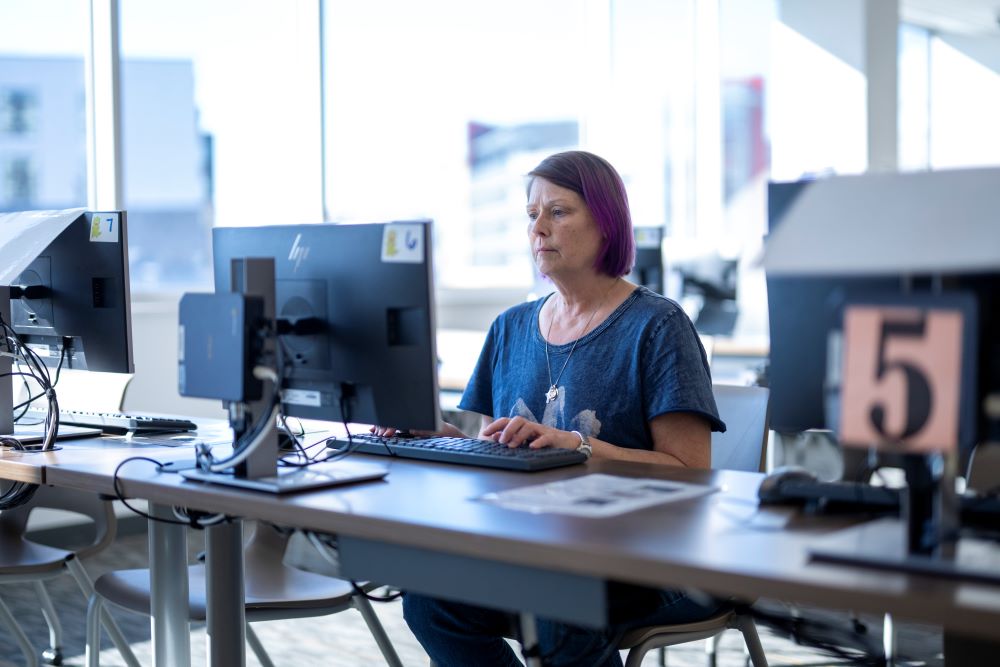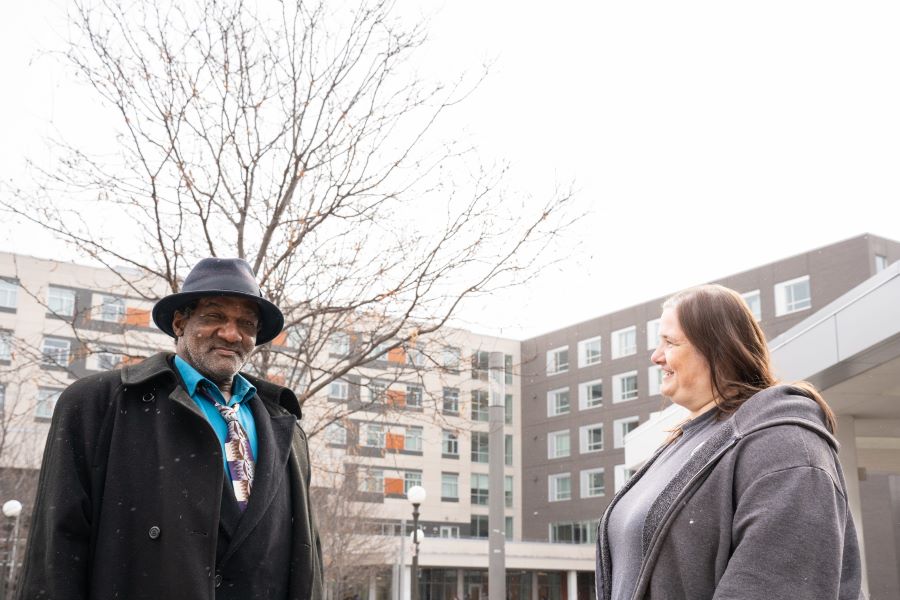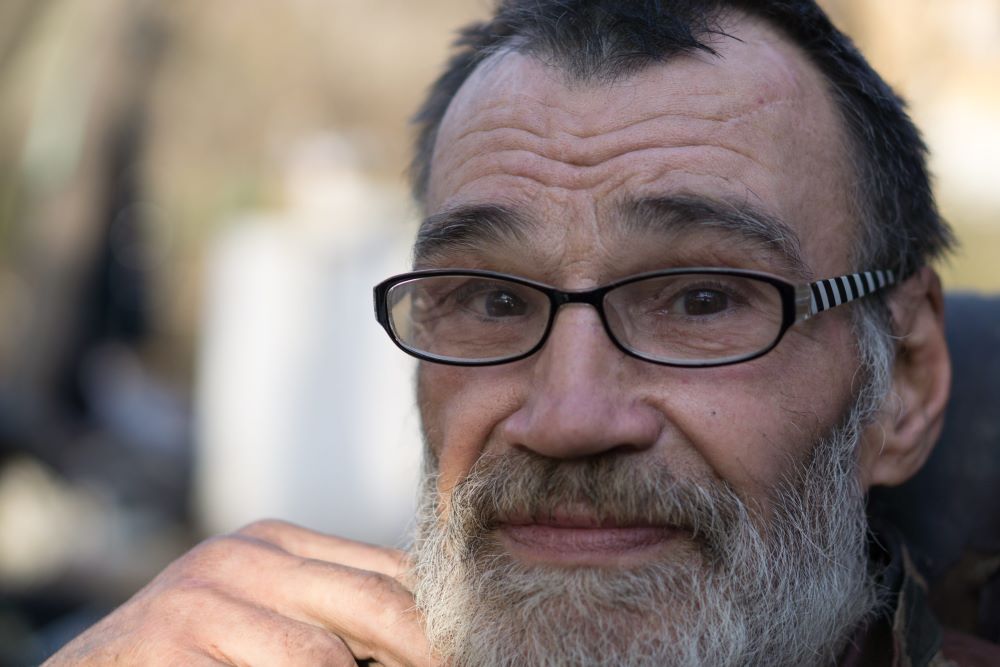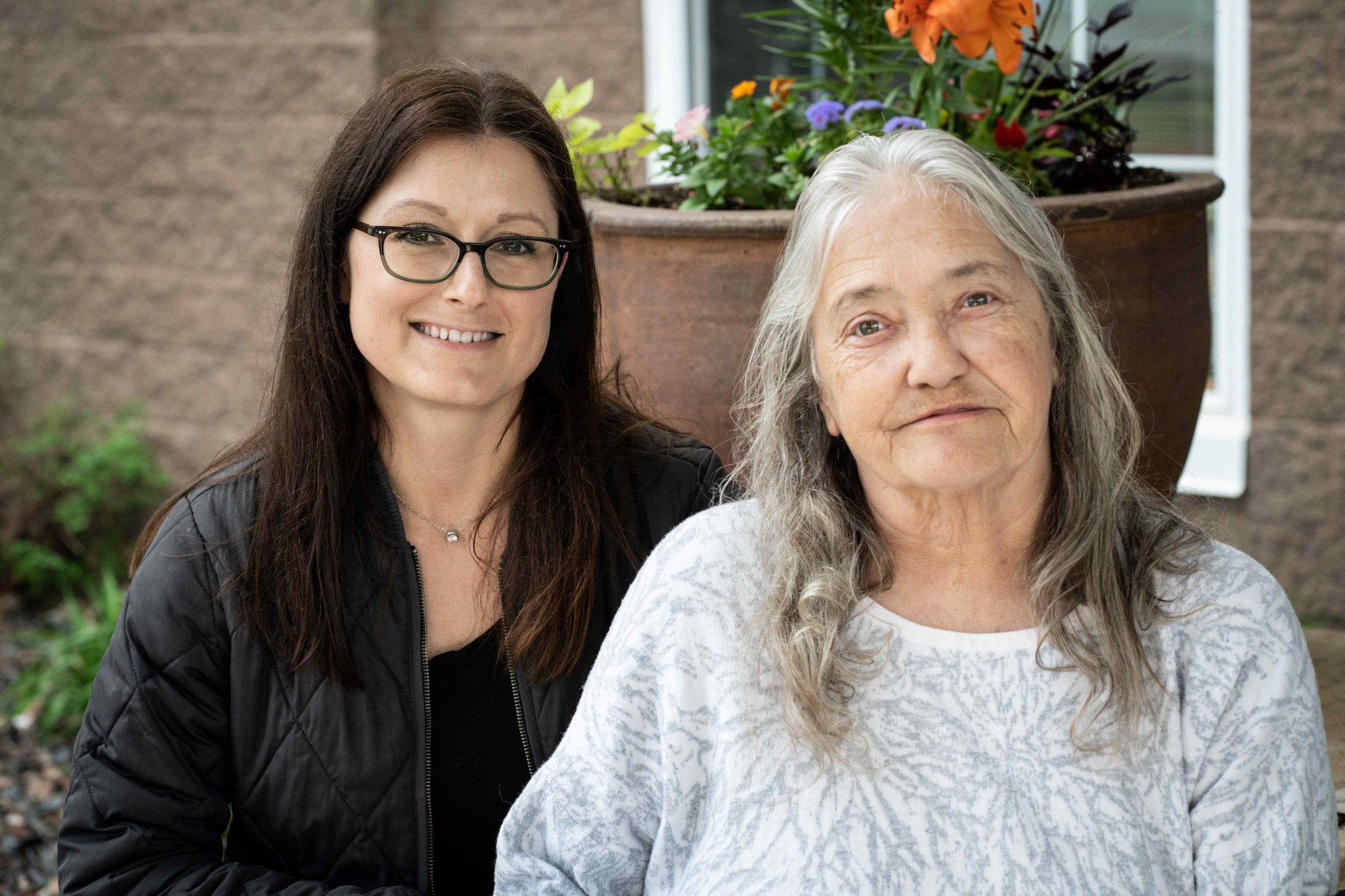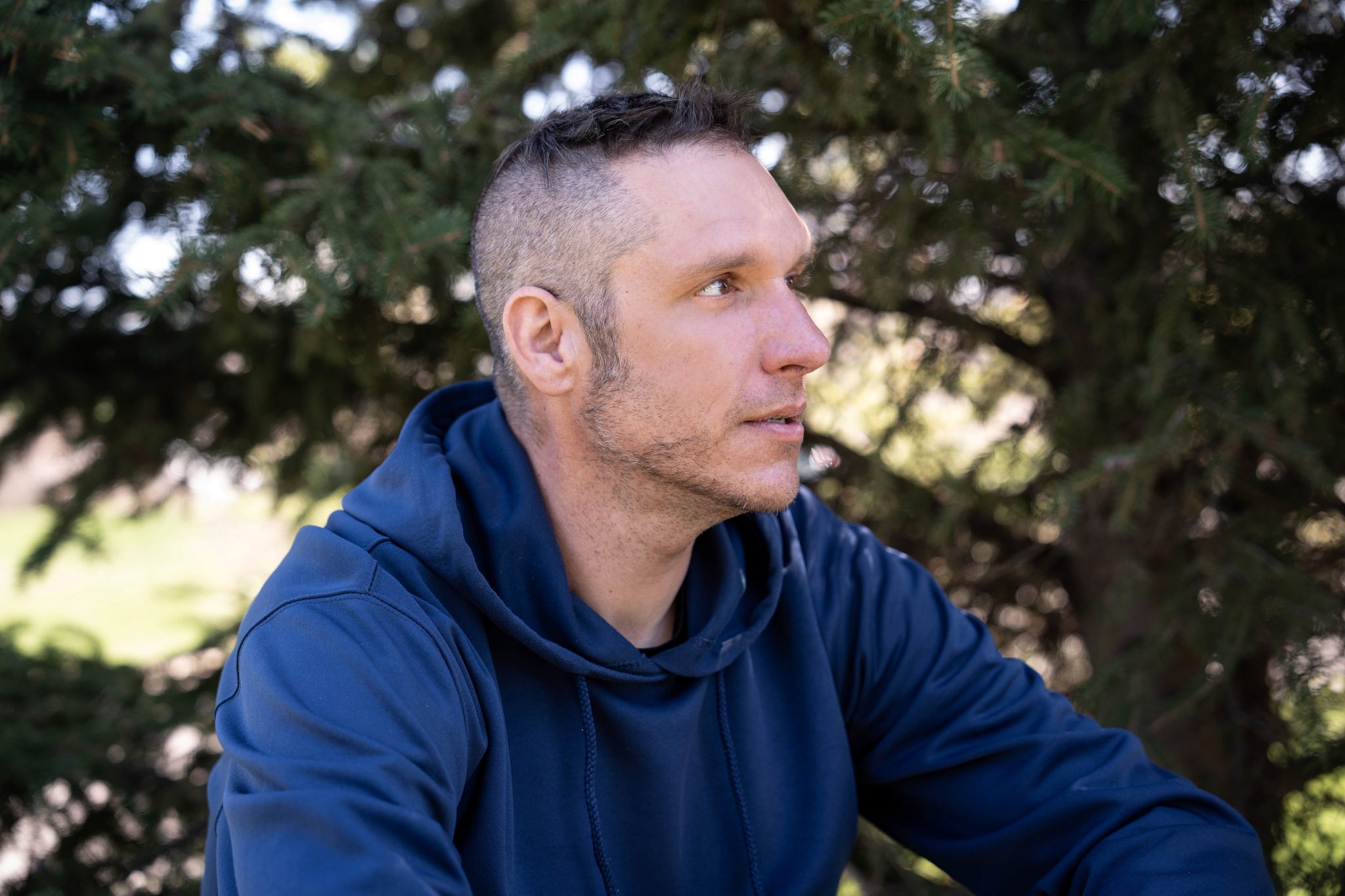Kristine’s Story at Dorothy Day Shelter
Kristine’s Story at Dorothy Day Place
Kristine worked as a nurse her entire adult life. While she’s done pretty much every kind of nursing, caring for newborns was always her favorite. She had a successful career that allowed her to raise children, travel, and feel fulfilled.
But in 2020, Kristine’s life turned upside down when her husband died unexpectedly. She was 54 years old at the time, and the loss of her life partner, “was almost too much to bear,” she said. Aside from dealing with her own grief, Kristine suddenly had to also navigate life with one source of income.
That same year, Kristine suffered a major medical crisis of her own and was unable to work. The going got even tougher, Kristine said, “and at the end of the day you’re not left with a whole lot of choices.” She drained her retirement savings and sold all her valuables, but continued struggling to make ends meet. And on December 20th of 2023, Kristine’s financial hardships caused her to lose her housing.
Safe in Shelter at Dorothy Day Place
“I had never felt more disposable in my life,” Kristine stated, “it began feeling like I was just a waste of resources.” When Kristine found shelter at Catholic Charities Dorothy Day Place in St. Paul, she began feeling seen again. “People wanted to help me . . . I was motivated to keep going,” she said.
At Dorothy Day Place’s shelter, Kristine was finally able to let her guard down. “It had been a long few years,” said Kristine, “but there I was safe, I was warm, I was fed — if you get down to it, what else do you really need?”
Beyond access to necessities like showers, laundry, mail, and a place to sleep, Kristine also found resources that helped her move forward. She was connected with a psychotherapist and got a cell phone for the first time in months.
Working Toward New Goals
“I was so grateful to have opportunities again,” Kristine said, “I had my own things, I had people to help me, and I started to meet people that I felt like I could laugh with again.” Kristine spent her evenings in the women’s shelter and walked across the street to the day center for meals and services. Her goal was to move into housing upstairs.
“I couldn’t wait to have my own room again, to be able to cook in my own kitchen, and just to have a space of my own,” explained Kristine. “I’m 58 years old, but I knew I could persevere.”
“Two years in a row I spent Thanksgiving, Christmas, New Years, and my birthday on the streets.”
A Home of Her Own
One day that March, Kristine’s new caseworker Jenae introduced herself and told Kristine that she had a lead on housing. Kristine was moved into her own apartment three weeks from that day.
“Two years in a row I spent Thanksgiving, Christmas, New Years, and my birthday on the streets,” explained Kristine. “When Jenae told me there was an apartment for me here, I couldn’t believe it.”
Since then, Kristine has worked hard to make her apartment feel like home; she has meticulously decorated, grown a collection of houseplants, and for the first time in years, will decorate for the holidays.
Finding Deeply Affordable Housing
Joshua’s Story
Joshua is the kind of person that you’d want as a neighbor. He’s friendly, respectful, and seems to know a little bit about everything. He is 34 years old now and has been through more than his fair share of challenges in life — including a stint in jail for something that happened when he was a younger man. About that time, Joshua said, “I knew that I was never going back. I knew that this was my opportunity to start over.”
Starting over with a criminal record is not easy, even if you’re young. Joshua secured a job at a restaurant as he exited jail but was experiencing homelessness at the time. He knew he needed to earn more money, but couch-hopping, sleeping in the Minneapolis skyways, and finding other places to spend the night made that extremely difficult. Still, Joshua found a second job at the Mall of America and saved every dollar he could.
The Importance of Deeply Affordable Housing
Shortly after finding a second job, Joshua heard about Catholic Charities Evergreen Residence in Minneapolis — a deeply affordable, low-barrier, permanent housing program for adults. Evergreen’s proximity to downtown Minneapolis and public transit, single room occupancy, and internet access stood out to him. Joshua applied for a unit and was accepted right away. “It felt like I had finally made it over a huge hurdle,” he said.
With affordable housing at Evergreen, Joshua was able to spend time in the computer lab refining his resume and looking for jobs that offered more regular hours. After a couple of weeks, he applied to work at a local pest control company and was hired. “The work-life balance is just perfect,” said Joshua, “they even provided a company truck for me and pay for the gas.”
A Permanent Place to Live
With a permanent place to call home, Joshua has been able to dedicate more time to his personal and professional development. He’s currently studying to become a licensed pest controller and recently registered an LLC under his name. Joshua has been working really hard and shared that, “new things and failure don’t scare me at all, I’ve found my oasis here and I’m going to figure things out.”
Outside of work, Joshua likes to spend his time doing music production and working events as a DJ — things that he can do again now that he has a place of his own and money to invest in equipment. “If you’re going through homelessness or other hard times, this is the place to go,” Joshua said, “Moving here allowed me to hit the reset button—it has helped me accomplish so much.”
“If you’re going through homelessness or other hard times, this is the place to go,” Joshua said, “Moving here allowed me to hit the reset button—it has helped me accomplish so much.”


Exiting Long-Term Homelessness
Roland’s Experience with Long-Term Homelessness
Roland is a natural storyteller who loves to laugh and will always greet you with a smile and a joke. He is from the Midwest and describes himself as a “survivor.”
Roland started working when he was thirteen years old and takes pride in being self-sufficient. He led a long career with the Ford Motor Company but ended up struggling after being part of a large layoff. Roland had some money saved but was unable to find work. He recalled that, “when my money ran out, it was the first time in my life that I had nothing to spend and no place to go.”
Spending Years Without a Home
That’s when Roland started experiencing homelessness. He slept on couches when his friends had enough room and stayed at different shelters for years on end. And for two full years, Roland slept outside.
After those two years, Roland had become very familiar with the resources available in the Twin Cities for people experiencing homelessness. He had become accustomed to the freedom of sleeping outside and was unsure about who he could trust. “There are some people that refuse to come inside because there is something about the nomadic lifestyle that people gravitate to,” Roland explained. “If you do something long enough, it becomes embedded.”
But as he began to feel the effects of aging on his body, Roland started spending his nights at the overnight shelter at Dorothy Day Place. There, Roland had his needs met and became so accustomed to living in shelter that he wasn’t actively looking for a place of his own. But then one day Roland had a conversation with Brenda, one of the staff at Dorothy Day, that motivated him to work towards something he hadn’t considered in years.
Finally Finding a Place of His Own
Roland clearly remembers the day that Brenda left a note on his bunk, offering to help him find housing if he was interested. “If it wasn’t for Brenda, I probably would have never pursued housing,” Roland said. “I’m a professional street person — I knew how to survive out there.”
As Roland worked with Brenda to apply for housing, it slowly began to seem possible. He was living on an extremely low income but worked hard to set money aside. “It’s really scary to put away what little money you have in that situation,” Brenda explained, “but it’s an important investment in yourself.”
About three months later, Brenda called Roland into her office to share the news she received early that morning: there was an apartment available that he qualified for. “It felt like a miracle,” Roland said. Brenda went to pick up keys that afternoon, and the apartment upstairs at Dorothy Day Place would be move-in ready that weekend.
“This is a great place, ” Roland said, “it saved my life.”
A Model That Works
Roland credits Dorothy Day Place for providing him with the resources he needed to secure a place of his own again – for the first time in over a decade. “When you leave this shelter, you may not have any money, but you can go to the day shelter right across the street,” explained Roland. “They have everything you need: showers, socks, clothes, and resources upstairs — they can help you get a job, apply for benefits, and even find housing.”
Amidst Roland’s excitement about having a place to call home again he smiled and said, “this is a great place, it saved my life.”
How Shelter Helped Patrice
Losing Housing and Seeking Shelter
Patrice is a mother and grandmother who has always taken care of her family, regardless of the many hardships that have come her way. As of last September, she and her two teenaged granddaughters were happily living together, and Patrice had a good job as a caregiver at an assisted living facility. But suddenly their lives were completely uprooted.
It was the time of year when her grandkids were getting back into their school routine, and the morning had been busy. Patrice was at work when she got a bad feeling about something. “I usually got done with work at 4:30 p.m. but something told me to go home, so I left at 2:30 p.m. that day,” Patrice remembered. “When I got back to my apartment, there was a crowd of first responders and neighbors standing around my door – it had burned completely and was still smoking.”
Patrice received a candle as a gift from a coworker earlier that week, and she was horrified to realize that she must have accidentally left it burning. In complete shock, Patrice frantically tried wiping soot off the blackened walls and couch. It took a while before reality set in; she wouldn’t be able to save their home. At that moment, Patrice remembered that her granddaughters were returning from their basketball game soon. She needed to come up with a plan, fast.
Shelter: A Safe Place to Go
Fortunately, Patrice’s grandchildren had a friend at school whose family was able to temporarily take them in. But with nowhere for herself to go, and no family to fall back on, Patrice made her way to Catholic Charities Dorothy Day Place in downtown St. Paul to spend the night. For the next three weeks, she continued to work and relied on the emergency shelter while looking for somewhere she could be safe with her granddaughters.
After 20 days downtown, Patrice secured a spot at Catholic Charities Family Service Center in Maplewood – a shelter for families that provides wraparound services to help obtain permanent housing.
Following the traumatizing and exhausting experience of losing her home, Patrice remembered the relief she felt at the Family Service Center. “When I got welcomed at the door, suddenly everything changed,” she said. “It was like I could finally rest mentally – and I was so grateful to be somewhere comfortable with my grandkids again.”
“This place has been like a safety net for me, and the people here have your back,” explained Patrice. “I’m getting back on my feet – and I’m doing it for my granddaughters.”
Working Hard and Making Progress
Patrice was also glad to discover that the Family Service Center already contacted the school district about transportation so her granddaughters could easily travel to their high school. And while the girls were at school each day, Patrice took advantage of the resources available at the shelter.
Patrice continued to work and save money and spent her free time studying in the computer lab to get a Community First Services and Supports (CFSS) certificate – a key certification for professional caregivers. Now, Patrice has her eyes on an apartment in St. Paul and wants to turn her past traumatic experiences into a skillset that she can use to help other people.
“This place has been like a safety net for me, and the people here have your back,” explained Patrice. “I’m getting back on my feet – and I’m doing it for my granddaughters.”
Experiencing Homelessness as an Elder
Experiencing Homelessness as an Elder in Minnesota
Lee is a classic Minnesotan — he has lived his whole life in White Bear Lake and his ideal vacation includes fishing and sleeping under the stars in the Boundary Waters Canoe Area Wilderness.
But Lee’s life has been challenging for as long as he can remember. Lee lost his father unexpectedly in high school and had to drop out to help pay rent. Lee spent most of his adult life supporting his mother, and making ends meet was never easy.
When Lee started a new career as a trailer mechanic, he was hopeful that it would improve their situation. But one day, Lee slipped at work and severely damaged his knee. Lee needed knee surgery and couldn’t return to work for a while. During Lee’s recovery, he was rear ended on the way to one of his medical appointments. The accident nearly killed him. “I got hit at about fifty miles per hour,” Lee stated, “and it permanently messed up my neck and back.”
Trying to Save Their Home
Lee’s mother fell ill shortly thereafter in 2011. Lee was still unable to work and suddenly found himself responsible for his mother’s caretaking. “I was the only one who could take care of my mom, and we were already struggling just to keep a roof over our heads,” he said.
Lee eventually found sporadic work and accomplished his goal of keeping his mother in their home until she passed away in 2019, but at a serious cost to his own health. During those 8 years, Lee’s back and neck problems worsened, leaving him with mobility issues and chronic pain. Minnesota’s COVID-19 rent relief program allowed Lee to maintain his housing during the pandemic, but when assistance ran out in the summer of 2022, he ended up being evicted — two months after his 50th birthday.
Nowhere to Turn
Without anywhere to go or family to turn to, Lee began sleeping in the woods near his neighborhood.
“I couldn’t move around very well and sleeping on the ground with chronic pain is like torture,” Lee explained. “But I wanted to stay in the community I’d been in my whole life.”
Lee had a daily routine of going to the public library in White Bear to charge his phone and rest before returning to the woods to sleep. But one night a nasty storm blew through town and destroyed Lee’s camping setup. He was forced to abandon his belongings and call an ambulance for himself that night.
“I’ve got my eye on an apartment that’s only a block away from where my mom is buried in White Bear Lake,” Lee said. “It would be a perfect fit for me — I can’t wait to get back home.”
Resetting at Dorothy Day Place
Upon his release from the hospital, Lee was brought to the Dorothy Day Place campus. “I don’t know if someone was smiling down on me or what, but I was fortunate to get a shelter bed right away,” Lee remembered.
After six weeks in the overnight shelter, Lee moved into Focus Forward, a Catholic Charities program that offers intensive case management to help connect people with housing as quickly as possible. The programs serve people of many different circumstances, including elders experiencing homelessness in Minnesota. Lee described how the resource coordinator at Dorothy Day place made a difference for him: “She was like a godsend. She was kind to me right away, got me started with my paperwork, and even advocated for me when my eligibility for benefits was unclear.”
Now, Lee is in better health and is doing everything in his power to secure housing and work.
“I’ve got my eye on an apartment that’s only a block away from where my mom is buried in White Bear Lake,” Lee said. “It would be a perfect fit for me — I can’t wait to get back home.”
How a Family Experiences Homelessness
Suddenly homeless with nowhere to turn
Diana is the kind of person who puts others first. She is an experienced nursing assistant and a passionate mother who says that her children “mean everything” to her.
Diana moved to Minnesota at the end of 2021 in search of better opportunities for her family. Over the next six months, Diana did everything she could to establish a quality life for her kids. She found a good job, and her children were settling into their new home in Saint Paul. Diana was proud that she had kept her family safe and healthy through the coronavirus pandemic and was looking forward to the future.
That’s when disaster struck. A fire destroyed the duplex that Diana and her children called home — along with most of their belongings. “Just like that, we lost everything,” Diana said.
Suddenly, Diana found herself with no home and nobody to turn to for support. Her landlord wasn’t answering her calls, and she didn’t have any family who could help her. So, with no other options, Diana took her children to the nearest emergency shelter.
For the next year, Diana and her children lived in a few different shelters that serve families experiencing homelessness. Diana explained that some places were better than others, but it’s just hard to be in a shelter with young children — especially during the holidays. She couldn’t make them home-cooked meals, and they were constantly packing and unpacking their belongings. To Diana, it felt like no matter how much paperwork she filled out or how many calls she made, she would never find a place for her family.
Finding refuge at the Family Service Center
But in June 2023, Diana was connected with Catholic Charities’ Family Service Center shelter. “When I got to the Family Service Center, I felt so welcomed,” said Diana. “You could tell every morning that staff are happy and kind. They tell you that they care, and then prove it…you can always count on them being there to help.”
The Family Service Center shelters up to 21 families at a time in Ramsey County, but its main function is to help families experiencing homelessness obtain permanent housing. And at any given moment, there are up to 60 families on the waiting list, with an average wait time of 3 weeks. Staff do everything they can to get families connected with stable housing as quickly as possible.
With a strong team behind her, Diana worked tirelessly with case managers to find housing. It wasn’t an easy process — including chasing down leads that would fall through at the last minute, making calls and not hearing back, and jumping through hoops she didn’t even know existed. But after three months of persistence, and with help from the Family Service Center, Diana finally secured a new home for her family. After working toward this goal for so long, newfound hope took Diana by surprise.
“When I got to the Family Service Center, I felt so welcomed,” said Diana. “You could tell every morning that staff are happy and kind. They tell you that they care, and then prove it.”
Finding her way home
“I haven’t cried in a long time,” said Diana through tears. “These are happy tears, breakthrough tears. It’s a testimony to accomplishing something that I wasn’t sure I could … especially as a mom who’s only 28 years old and has little ones.”
Diana walked into Catholic Charities’ Family Service Center carrying the burden of the past year’s traumatic experiences. When she left, she carried some new paintings and the keys to a place that her family could call home. “I’ve been through a lot,” Diana said. “But this place really helped me … now I just want to sit back and watch my kids grow.”
For the first time since moving to Minnesota, Diana’s family will be home for the holidays. From marking her children’s heights on the wall, to hanging ornaments on a Christmas tree, having a place to live means stability for Diana’s family. More than anything, Diana is looking forward to building a foundation and creating core memories together with her family.
Carol’s Story: Elder Homelessness
A life changing phone call
Carol describes herself as “one tough cookie.”
Having grown up in an abusive home and later navigating her own journey to sobriety as a young adult, Carol learned that she could rely on herself to figure things out. But in January 2020, Carol received a life-changing phone call—her son, Erik, was in the hospital after experiencing a massive left-brain stroke. At only 49 years old, Erik had been busy working as a professional photographer in St. Paul when this tragic event derailed his life. The stroke left Erik with severe mobility issues and unable to speak.
Experiencing emergency shelter as an older adult
At the time, Carol was living in Wisconsin, far away from the hospital where Erik was receiving care. She was heartbroken to hear that Erik was likely going to need to stay in a nursing home while he recovered. “I knew I had to get back home to Minnesota to be with him,” Carol remembers.
Doing whatever she could to be closer to her son, Carol decided to stay temporarily at an emergency shelter in New Richmond, Wisconsin, about forty miles east of the Twin Cities. For months, Carol spent hours driving back and forth to manage the aftermath of Erik’s hospitalization. She moved belongings out of his apartment, made sure his beloved cat was cared for, and coordinated with Erik’s doctors as he recovered from heart surgery—yet another consequence of his stroke.
Carol eventually moved to a Minneapolis shelter location, but finding an affordable apartment in the Twin Cities remained out of reach. She desperately wanted to get Erik out of the nursing home, but at that point, the pandemic was running rampant. “I couldn’t even go and see him.” Carol remembers. “I was tearing my hair out.” Just when Carol was gathering the resources she needed to be able to move Erik, she contracted COVID-19.
Light at the end of the tunnel
Carol was required to stay in a COVID isolation room with others who were very sick. She describes this time as, “insane and scary. You’re so displaced and you just lose touch. There was no place to go for peace and quiet — to get away from everybody else’s problems so you could focus on your own.”
While Carol recovered from COVID, she was connected to Catholic Charities’ Homeless Elders program, which provides intensive case management and advocacy on behalf of vulnerable older adults. It was then that Carol met Case Manager Melea Blanchard. “If it were not for her, I don’t think I would’ve made it,” says Carol. “After I met Melea, I could see a little light at the end of the tunnel. It was like somebody actually cared.”
“After I met Melea, I could see a little light at the end of the tunnel,” says Carol. “It was like somebody actually cared.”
Homeless elders program helps Carol start fresh
Melea worked to find housing for Carol that could also accommodate Erik. The two of them now live together in an apartment in St. Paul. “Since I have been out of the shelter, and Erik could come home, I think he has improved significantly,” Carol shares.
With stable housing, Carol has been able to manage her own health and secure resources for Erik as he works through speech and physical therapy. They still face challenges, but with a place to call their own—Carol says, “We are doing the best we can with what we’ve got.”
Carol lent her lived expertise at the Minnesota Capitol this year, testifying in support of Catholic Charities’ Homeless Elders program. “I’m an activist at heart”, Carol says, “seniors are not disposable. We are not stupid. We deserve dignity and respect.” With Carol’s help, legislation was passed that will make a difference for other older adults facing homelessness or in need of other support in our community!
A Program that Focuses on the Future
Meet Matthew
One year ago, Matthew was released from Hennepin County Jail with nowhere to go.
Struggling with addiction, this had not been Matthew’s first time in jail—but this time he had no one to call, nowhere to stay for the night. He hopped on the light rail without knowing which direction it was headed and rode it all the way to Saint Paul, where some outreach workers connected him with a shelter bed.
Focus Forward is a program started in partnership with Ramsey County to provide extra help to those left behind during the pandemic — Catholic Charities staff noticed that some people weren’t finding their way out of emergency shelter, so we pivoted our service structure to meet the needs of our community.
“One step forward and two steps back”
Over the next nine months, Matthew orbited the supportive services at Dorothy Day Place campus, where he slowly got to know Case Manager Michael Kaup. Eating his meals indoors but frequently opting to sleep in his truck parked outside, Matthew describes that time as feeling like “groundhog day”. But, one day he noticed that his legs were extremely swollen.
“I ended up taking a bus down to the hospital, going to the emergency department,” Matthew remembers. There, he was devastated to hear that the edema in his legs was caused by congestive heart failure. At only 44 years old, drug use and homelessness had taken a harsh toll on his body. Still, Matthew explains, “no one is ready to hear that.”
While hospitalized for the next two months, his doctors added an additional diagnosis: schizophrenia. Matthew suspects that he may have unknowingly been experiencing symptoms for a long time, something that is all too common amongst people experiencing homelessness.
Finding Focus Forward
After being discharged from the hospital, Matthew returned to Dorothy Day Campus. There, Case Manager Michael Kaup referred him to Focus Forward, an enhanced shelter program that works to quickly connect people with housing once they’re ready to take the next step. While staying at Focus Forward, Matthew felt safe to get good sleep, eat regular hot meals, and work with a case manager to navigate supportive services that would help build a more stable life.
Now, Matthew is more than 90 days sober. He’s living in housing that supports his sobriety, spends time at an Addiction Health Center, and is doing everything he can to improve his health.
“I’m fairly certain that Focus Forward saved my life,” Matthew said, “I could focus more on what I needed to do, and I was getting sound sleep . . . you know, just all those things people need when they are looking for new opportunities.
I hope for the best and no longer want to expect the worst. I want to share my story because if people can understand somebody in my position, it gives me hope for the future.”
Voice Podcast: Indigenous Ministry & Catholic Social Teaching
Indigenous Ministry, Our Interconnected Histories, and Catholic Social Teaching
Shawn Phillips, Lay Director of the Church of Gichitwaa Kateri and Office of Indigenous Ministry for the Archdiocese of St Paul and Minneapolis, shares stories from his ministry within our Native American communities, discusses the importance of learning about our interconnected histories, and reflects on this work within the context of Catholic Social Teaching.
References
Adoption Program
Adoption Services are permanently closed as of October 1, 2016. This includes post adoption services which will be provided by Lutheran Social Service.
Catholic Charities has a long relationship with Lutheran Social Service and we are confident they will continue to serve our clients well.
We have seen the need for domestic infant adoptions decline significantly over the years and have come to the realization that there was diminished need for the services and that it can be met by other organizations in our community.
Toll-free: (800) 952-9302, Ext 2371

